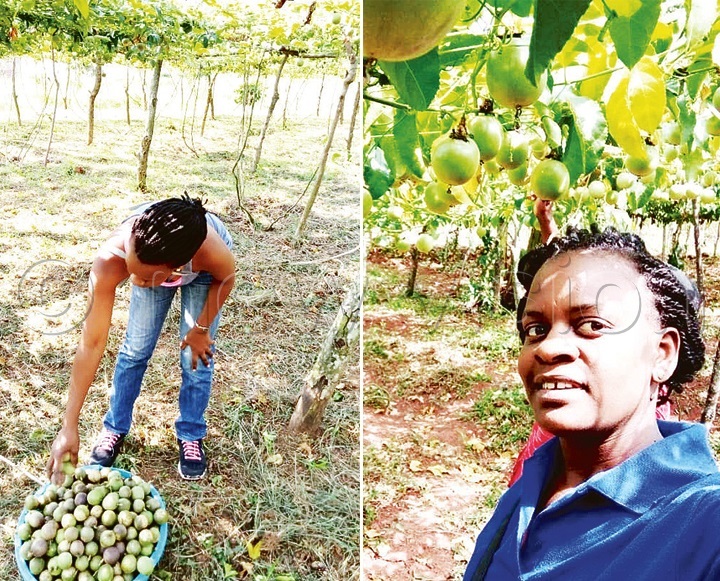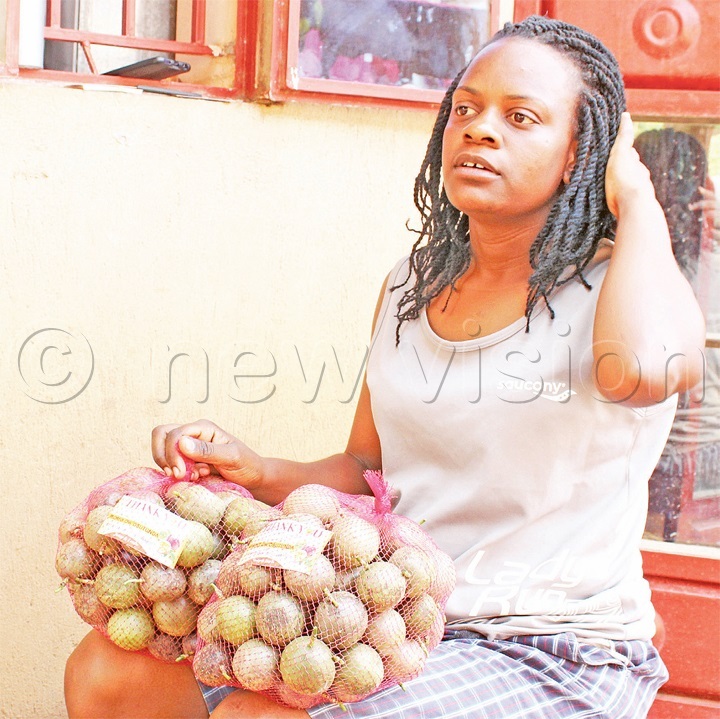Lockdown drove Nantongo into passion fruit trade
She lost two jobs after the COVID-19 lockdown and now vends passion fruits
Mourine Nantongo is a junior lecturer at the Uganda Christian University, Mukono.
The 28-year-old, who was also a social worker with Dwelling Places, an organisation that rescues street children in Kampala, is now a full time businesswoman.
However, with the outbreak of COVID-19, Nantongo's finances took a hit as universities were closed. She also lost her job at Dwelling Places after the withdrawal of donors' funds owing to the pandemic.
During the lockdown, she started a business vending passion fruits, which brings her sh2.4m a month.
I loved having two jobs. I was enthusiastic about both, which gave me favour before my bosses. With both my salaries, I took care of relatives and my mother who suffered a stroke five years ago. I was able to pay her hospital fees in addition to other bills such as rent, with ease until COVID-19 struck!"
Uganda was put under lockdown and other measures instituted to curb the spread of COVID-19 and for Nantongo, this blocked her sources of income.
"I never expected to lose both jobs at once. I became unfriendly at home. The maid asking for sugar and food, knowing I was no longer working, irritated me throughout the month of April when the country was under total lockdown," she recalls.
To control her emotions, Nantongo would leave home and sit by the roadside.
"Leaving home every day had been my routine. I would leave home to escape from stress," she says.
Nantongo realised that sitting at the roadside would neither put food on the table nor meet her family's other needs.
"One day we had run out of cash to buy charcoal and I decided to collect firewood in the neighbourhood to prepare meals. On my way back, my longtime friend almost knocked me as I was crossing the road."
She says it was not because the driver was reckless, but rather, Nantongo was lost in thought about how her family would survive during the lockdown.
Nantongo says she saw her friend getting embarrassed after seeing her carrying firewood on her head.
"He exclaimed and said firewood was below my standards. And then he gave me $100 (equivalent of sh370,0000) to buy charcoal instead of collecting firewood."
She opted to use this gift as capital to start a business.
Starting passion fruit business
The business options I thought about were food and market vending-related, especially after the President categorised them as essential services.
Nantongo chose vending passion fruits because it required little capital and there was ready market, given the fact that most parents were with their children at home and would buy passion fruits to make juice.
"After studying the market and the demand, I started looking for places where I could buy fresh passion fruits. I got four good places with good quality passion fruits in Kasese, Masaka and Mukono and Mbale," she says.
Her first stock was 120kg of passion fruits from Mbale. She invested sh200,000 and earned a profit of sh300,000 within one week.
Getting involved in the business
She was part of every step of the business until the fruits were delivered to the final customer.
Nantongo says this ensured she was not cheated by anyone in the process. In addition, her involvement enabled her to source only fresh fruits.

Contacting the farmers herself enabled her to gain their trust and thus they would give her passion fruits on credit and get paid after they are sold.
"The COVID-19 lockdown was my eye opener," she says.
My customers are impressed with my products, especially the good packaging and when they hear me speak English.
Nantongo says she works with four relatives that live with her. They help her in counting and packing the fruits.
Expenses involved
Every week, Nantongo spends sh100,000 on transport to the farms. The other expenditure is on airtime and data which helps her reach her customers.
Special branding and packaging
Nantongo says many people do the same business, but do not know how to package.
"I decided to package my passion fruits in netted bags as opposed to polythene ones," she says. Nantongo also includes a ‘thank you' note in the form of a business card with her contact in the bag.
She says it is rare for Ugandan entrepreneurs to thank clients for supporting their businesses.
"The ‘thank you' note bears my contacts, which has attracted more customers," Nantongo says.
"I am involved in the packing of the passion from the garden to the customer," she says, adding that this has helped her minimise losses and damages during transportation.
Earning customers' trust
"Some people promise what they cannot offer.
For example, some entrepreneurs say they pack 60 passion fruits per bag and put 40 instead. "I am keen in counting and packaging because I want to give my customers what I promise."
"Sometimes if there are errors, I apologise because sometimes you get overwhelmed with the counting. However, I compensate them during the next delivery," Nantongo says.
Social media connection
She uses social media to market her products.
"Social media has connected me to many customers. They place their orders through social media," she says. Nantongo says she has never met most of her customers physically.
"Most of my office clients know that I am always in town on Wednesdays and Thursdays.
They, therefore, place their orders on those days."
Apart from social media, she looks for customers in offices, but ensures she observes the standard operating procedures (SOPs) set by the Ministry of Health and wears a face mask.
"Washing bays and offices have good market for passion fruits," Nantongo says.
Every week, she sells 200kg of passion fruit, earning a profit of sh600,000, translating to sh2.4m a month.
"This is better than what I used to earn as a university tutor," she adds. However, she is at crossroads on whether to return to the university or not after the situation normalises.

Her social media strategy attracted not only customers, but suppliers as well. "Farmers would see some of my posts and call me to support their farms too."
Juice for sale
"I sell a five-litre jerrycan at sh10,000-sh15,000. If a client wants concentrated juice, I charge an extra sh5,000 to cater for the sugar, electricity used and packaging (jerrycan). I make sure I keep it concentrated," she says.
"A disposable cup goes for sh1,000, with her biggest customers being bodaboda riders.
"Because of this, I have been able to sustain my family. This has also helped me to keep the people in my house occupied as opposed to watching TV the whole day."
Challenges
"I made losses simply because I bought passion fruits from a middleman as opposed to the farmer directly," she recalls.
The passion fruits were of poor quality and blemished, which dented my reputation.
"This helped me learn that at every stage of business, I must be involved to avoid being taken advantage of."
There is also a challenge with price fluctuations depending on where one buys the passion fruits.
"I have learnt to explain to my clients whenever the prices change. This means reducing the number of passion fruits packed from 60 to 55 fruits at 10,000," Nantongo says.
"However, many clients like the fact that I always tell them the truth about the market before supplying them. In the end, they do not get disappointed."
Best practices
To ease her movements, she starts each day with a route plan on how she will meet her clients.
She has a book where she notes down clients that take her goods on credit and makes a follow-up. She also records her expenditure.
The record book also helps me in knowing the direction of my business is in terms of profits and losses.
Plans
I plan to expand the business and register it. I hope to buy a car to ease transportation, especially getting to my customers in large numbers. Currently, I depend on friends who lend me their cars.
I also plan to rent a place where I can carry out passion fruit farming on a large scale other than depending on other farmers.
Lessons learnt
I have learnt that there is fortune in every business as long as you are passionate about it and give it enough time."
Nantongo says apart from professionalism, small-scale business pays much more than office work, but creativity, innovation, integrity, services above self and humility are key.